Tag: sidney chanutin
Featured in The Plaid Horse
A new life is something to celebrate, but when a newborn foal has complications and a fever of unknown origin, the fear can be overwhelming. For Robin Hogan of Myrland Stables in Davie, Florida, getting her newborn foal the help it unexpectedly needed was the first priority.
Hogan fell in love with her mare Vogue, a black and white Gypsy Vanner, when it came to her barn for training. The two connected instantly. There was only one caveat; Vogue was pregnant. Still, Hogan welcomed the added bonus and was excited for the chance to raise a foal that could eventually join Vogue in the equine therapy program that she is planning.
Vogue had a somewhat difficult birthing, but eventually “My Wildest Dream,” known in the barn as Eros, was born. Everything seemed good as Hogan navigated the early days of caring for Eros and his mother after birth, but at only four days old, Hogan noticed that Eros’ playful, spirited attitude had changed.
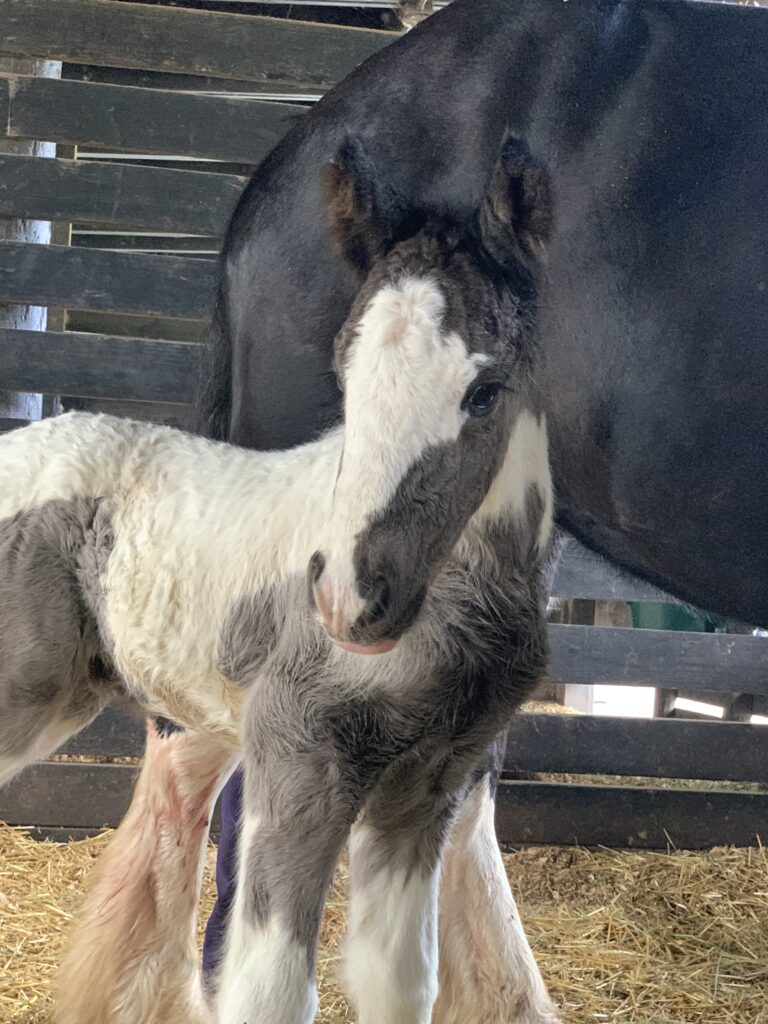
“He was a little bit on the lethargic side,” remembered Hogan. “I walked Eros and his mom out to the pasture, and he seemed to decline when he was there, like it must have taken all his energy to get to the pasture. It was surprising because just the day before he was running around, and even the night before he was running and playing. It just happened that quick. It was crazy. I noticed he was peeing out of his umbilicus (navel) which was a big red flag.”
Hogan was able to move Eros back to the barn and found that he had an extremely high temperature. Hogan called her veterinarian, Dr. Natalie Carrillo, and they were able to bring the foal’s temperature down slightly. However, when it spiked again, he was administered intravenous fluids and the decision was made to take Eros to Palm Beach Equine Clinic (PBEC) in Wellington, Florida.
Hogan noted, “PBEC had come highly recommended, and I thought, ‘If you’ve got a chance to save him, this is it.’”
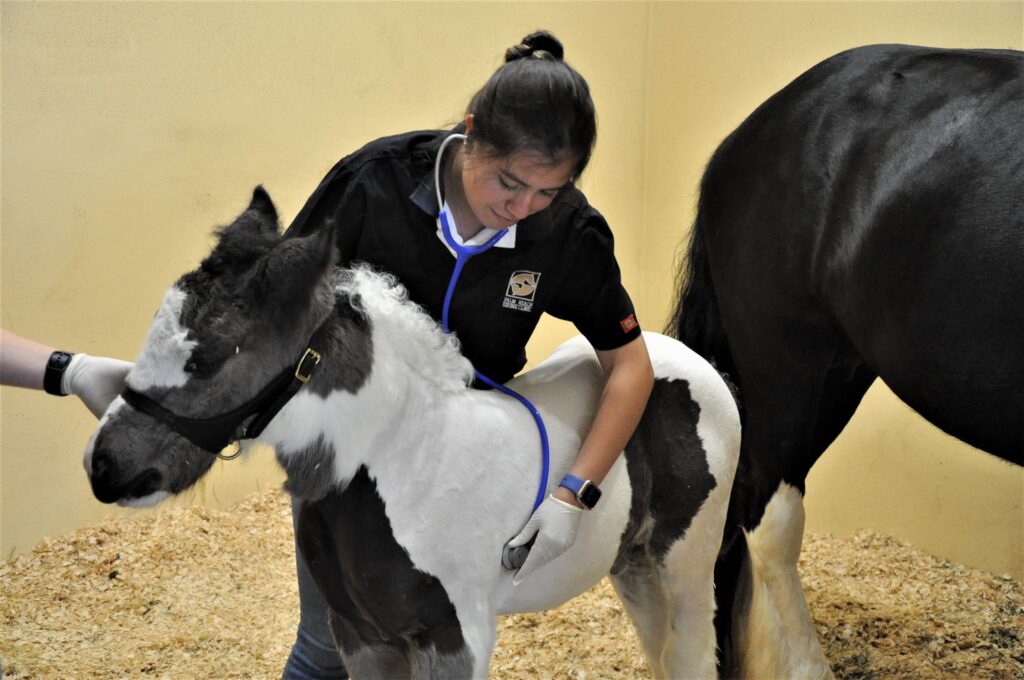
Dr. Clarisa Romero examining Eros at PBEC. 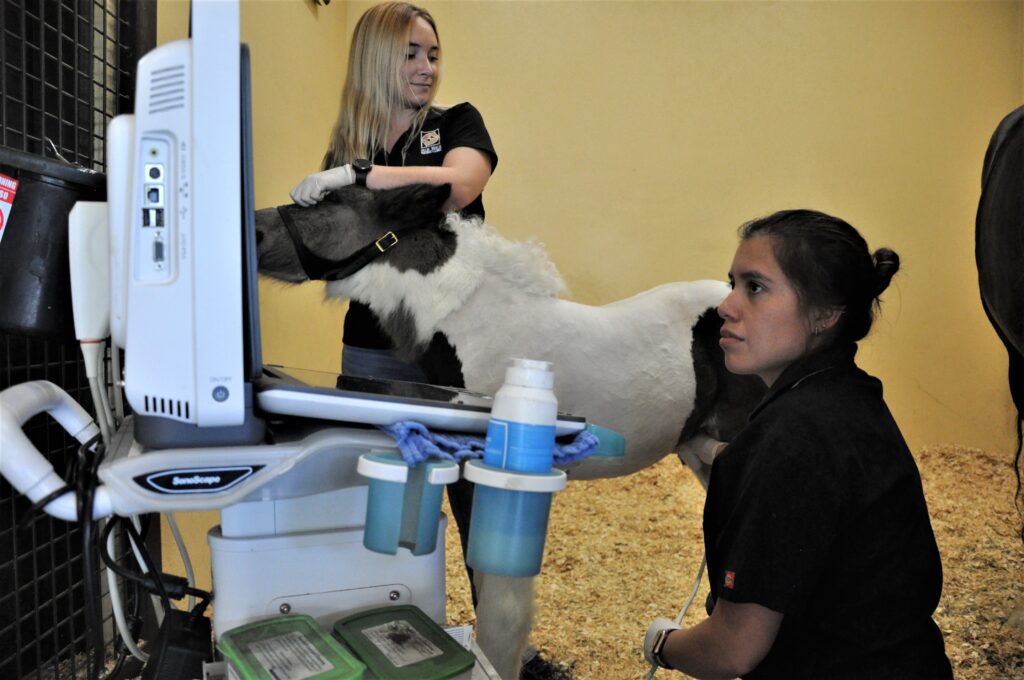
Dr. Romero performing an ultrasound on Eros. 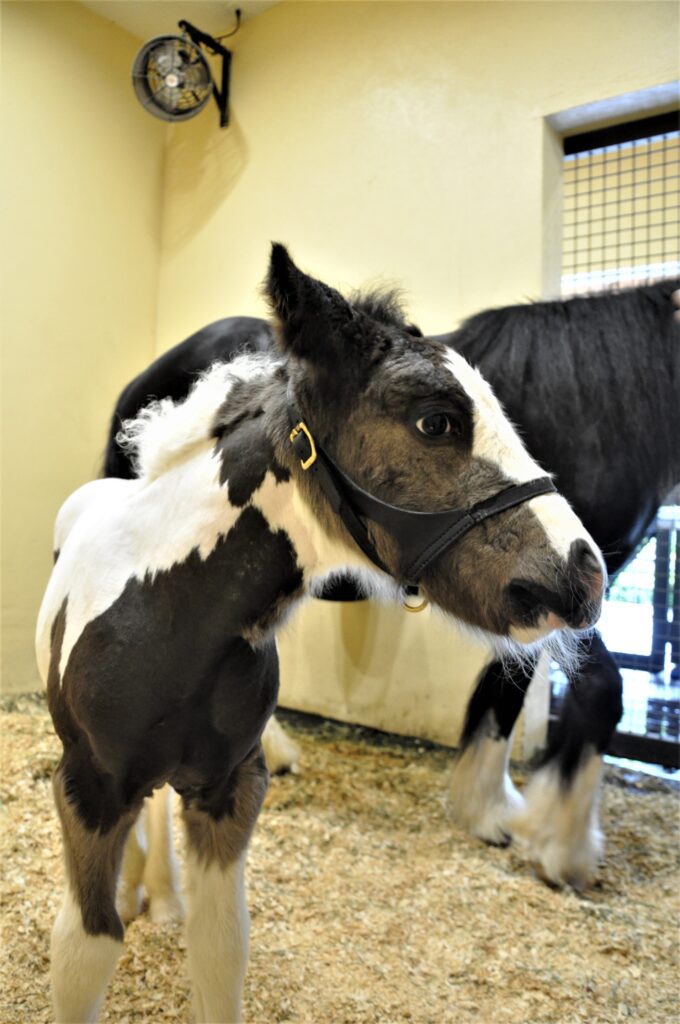
Eros owned by Robin Hogan 
Vogue with Eros
Eros was admitted to Palm Beach Equine Clinic and placed under the care of board-certified internist Dr. Peter Heidmann and Dr. Sidney Chanutin. Upon examination and palpation of the foal’s umbilicus, they noted urine dripping out.
During fetal development, the umbilicus is connected to the urinary bladder via a tube called the urachus. Normally, within a few hours after birth, the urachus will shrink and close at the navel, and then urine is diverted to empty through the urethra into the bladder. When the urachus does not close completely, urine can dribble out from the umbilicus. This condition is referred to as patent urachus, and it may happen within the first few weeks of life, even after the urachus originally appeared to have sealed at birth.
Eros was diagnosed with patent urachus, along with omphalitis (infection of the umbilical stump) and septicemia (bacteria present in the blood), which are severe complications commonly seen in foals.
Dr. Chanutin performed an ultrasound examination on Eros, which confirmed the patent urachus and helped determine the presence and extent of infection in the umbilical structures. Blood cultures and a complete blood count were taken, as well as bacterial cultures of the navel to determine which bacteria were causing the infection. This helped the veterinarians confirm the appropriate antibiotic choice for the foal.
In some cases, surgical removal of the infected navel structures is needed. Surgery can fully close the opening between the urachus and the bladder, but thanks to a quick and thorough veterinary diagnosis, Eros avoided surgery.
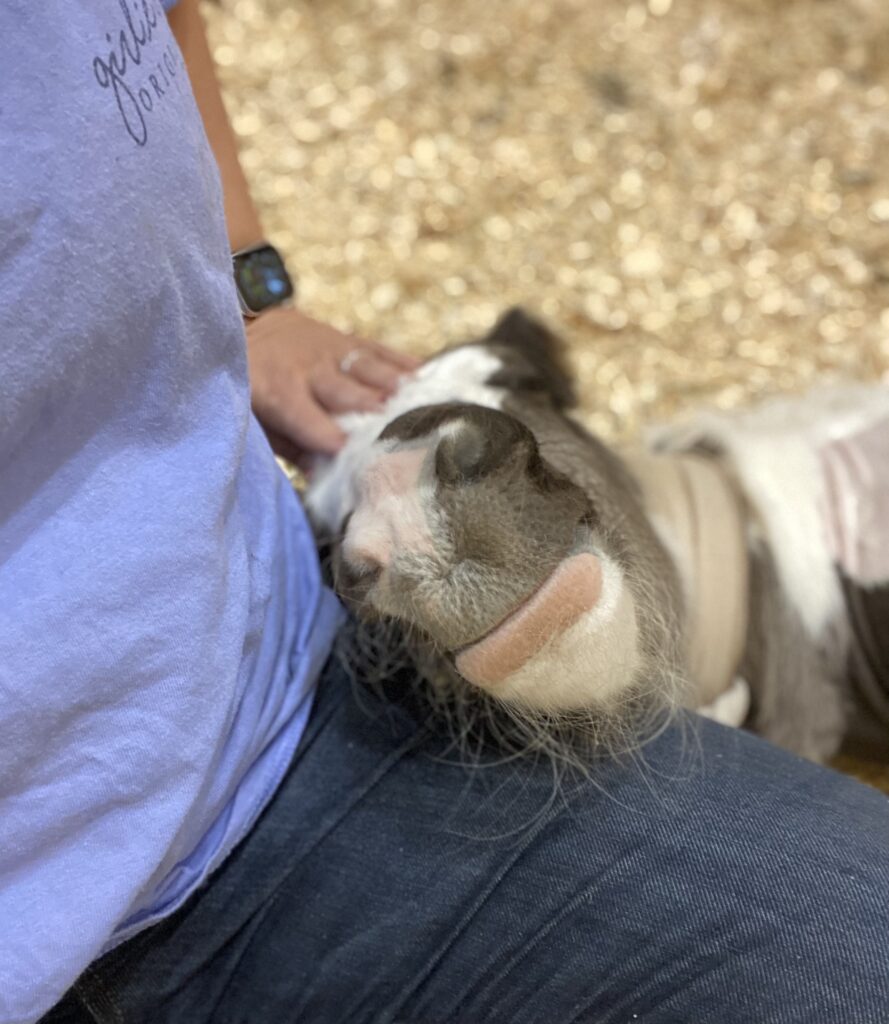

Robin and Eros at PBEC. 
Eros recovered at Palm Beach Equine Clinic for two weeks with his mother Vogue by his side. He was treated with systemic antibiotic therapy, anti-inflammatory therapy, and gastroprotectants (Omeprazole). His umbilicus was treated topically to promote closure of the patent urachus.
After discharge, Eros remained on medication for an additional four weeks. His owner reported that once he returned home, he soon returned to his normal, happy self. Hogan remarked, “I was going through all these emotions having never had a colt before, and then he puts his little head on my shoulder, and I thought well we’re going to give you all the care we can! It was such a scary learning experience for a new horse owner. It was a steep learning curve.”
Hogan credited her barn manager, Alicia May, for helping care for Eros, as well as Dr. Carrillo and the veterinarians of Palm Beach Equine Clinic. “I have such confidence now in my veterinary care team. I have to say it’s all a team effort,” she said. “I had no doubt that my horses were in the right place for this kind of situation.”
Having fully recovered, Eros is now seven months old, and Hogan is training him regularly, getting him used to working with humans and becoming less sensitive to his environment in preparation for his future equine therapy work with his mother Vogue.

Robin and Eros at his first hose show. 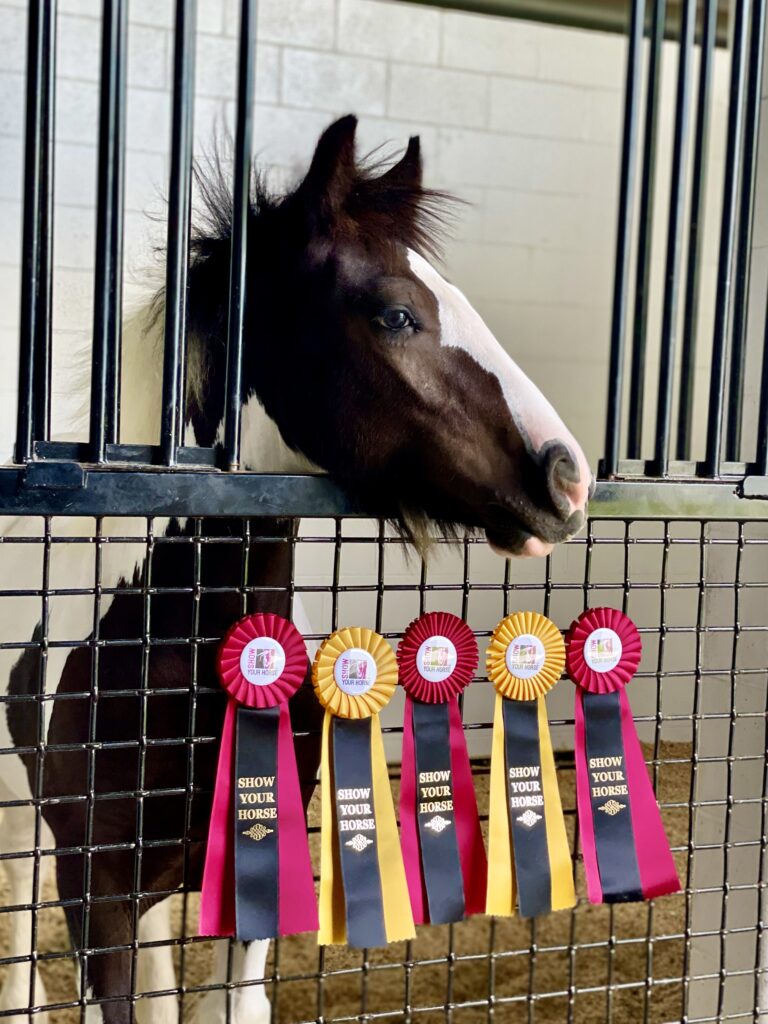
Palm Beach Equine Clinic is available 24/7 for any equine emergency and works regularly with referring veterinarians. For more information, call 561-793-1599.
Walking on Wire
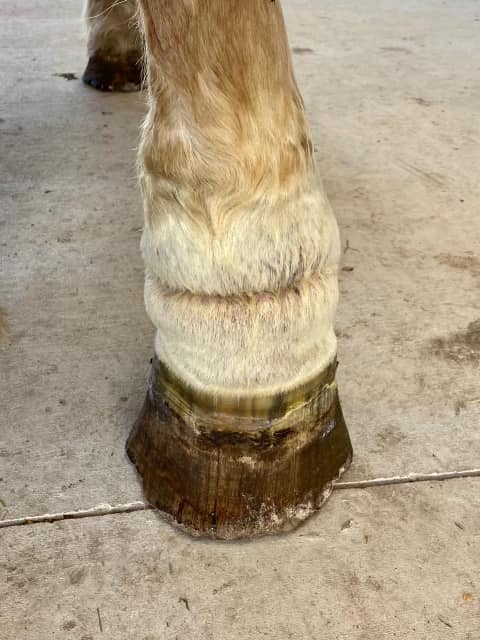
In February of 2021, Baby Girl Horse Rescue and Veteran Therapy Ranch in Fellsmere, Florida, rescued six Belgian Draft Horses that were headed for slaughter after a life of neglect. Ezekiel, known as “Zeke”, was one of the gentle giants who rescue organizer Van DeMars described as still having spirit in his eyes despite his desperate condition. “When I found out about Zeke, I insisted on buying him even if it was only to give him some care and then have to put him down humanely,” DeMars reflected. “I just did not want him to have to make the long, hard trip past the border to die a scary death.”
Zeke was suffering from a severely swollen, actively infected, and draining wound on his left front leg. He was lame at the walk and in evident pain and discomfort. Once Zeke arrived at the rescue, their veterinarian Dr. Karie Vander Werf took radiographs that painted a grim picture. The radiographs showed a metal wire had been wrapped around Zeke’s pastern bone, deeply embedded through the soft tissue and into the bone. She then immediately referred Zeke to board-certified surgeon Dr. Weston Davis for surgery at Palm Beach Equine Clinic.
Once Zeke arrived at Palm Beach Equine Clinic, Dr. Weston Davis, assisted by Dr. Sidney Chanutin, took additional radiographs to thoroughly assess the location and depth of the wire. “The radiographs confirmed a metal object was circumferentially wrapped around the mid-pastern bone, embedded into the soft tissue and remodeled the bone itself,” Dr. Chanutin revealed. On February 24, Zeke was put under standing sedation, given a local nerve block, and the wire was carefully extracted by Dr. Davis.
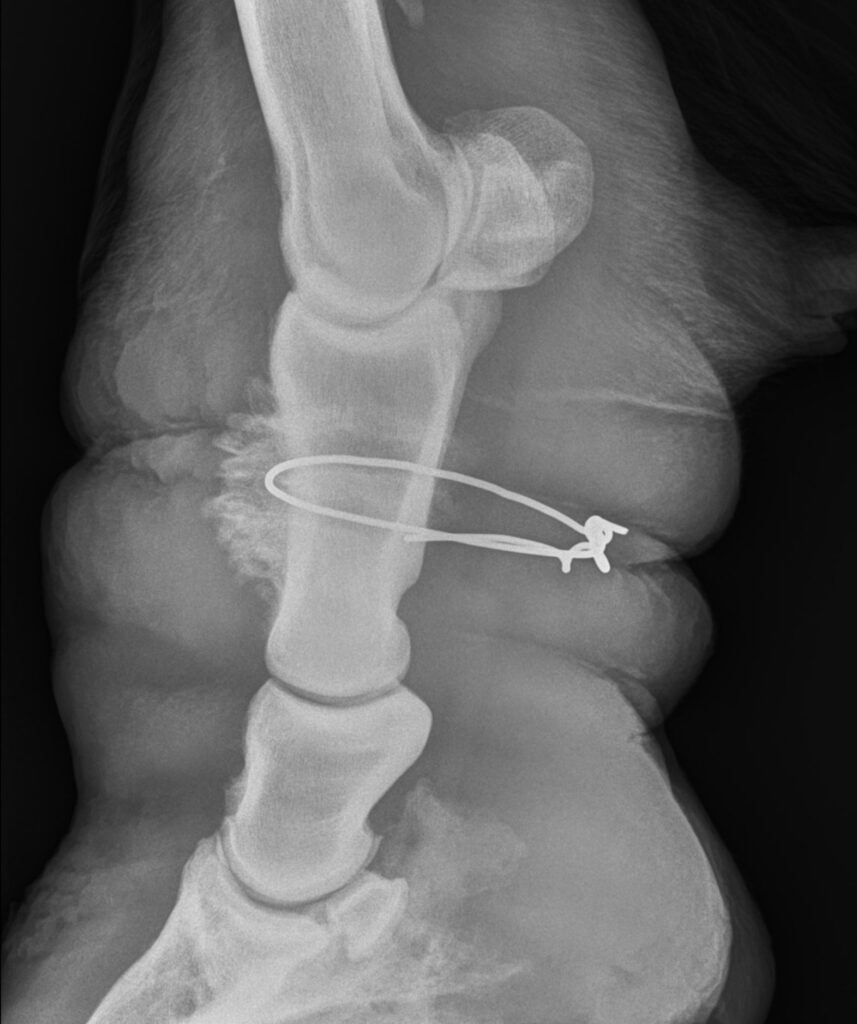
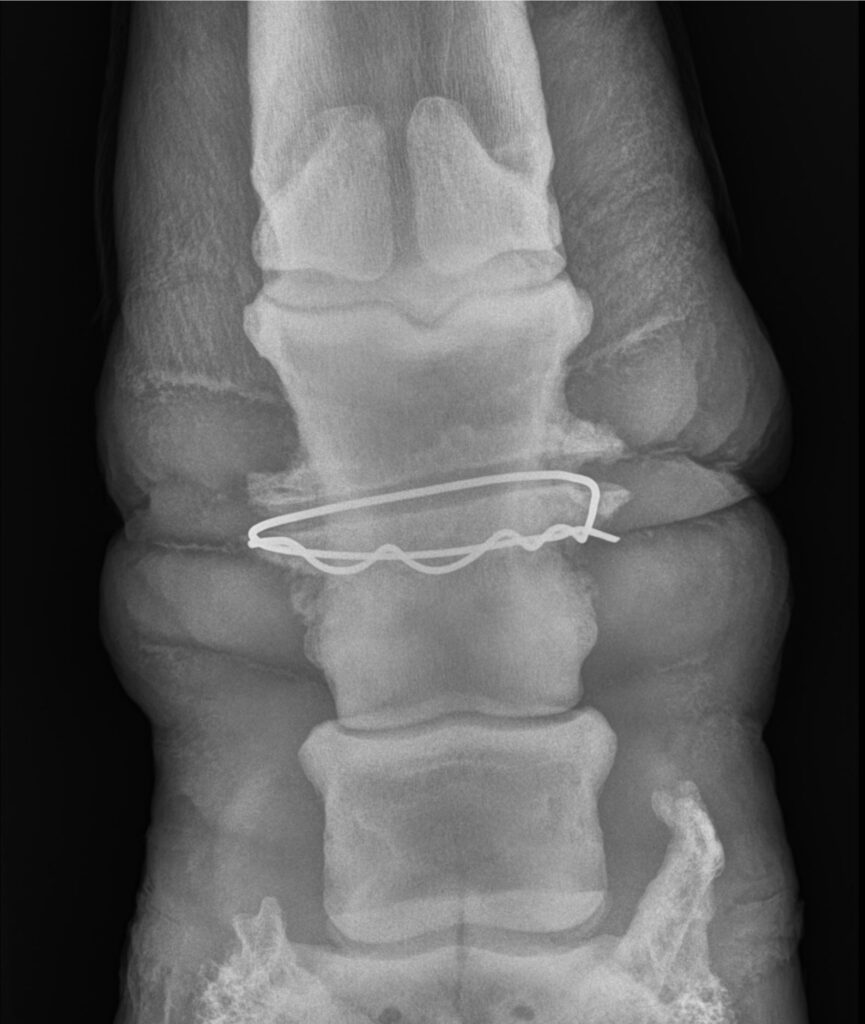
“Had the wire not been removed when it was, the infection would have continued to proliferate,” said Dr. Chanutin. “The infection and invasion of the wire into the soft tissue and pastern bone could have potentially cut Zeke’s life short.”

While neither the rescue nor the veterinarians could tell with certainty how this had happened to Zeke, it was apparent by the location and way the wire was twisted that it was likely placed there intentionally. It was clear the wire had been embedded into Zeke’s pastern for months, based on the level of bone remodeling that had taken place.
Reflecting on how he felt dropping Zeke off for surgery, DeMars said, “I was afraid but was very confident in Dr. Davis. I knew that if anyone could get that wire out and give Zeke a chance to have a normal life, it would be him. Later that evening, I got a text of a picture of the wire and I was in shock that they had already gotten it out so fast. I was elated beyond belief.”

Remarkably, Zeke’s stay at the Palm Beach Equine Clinic hospital was less than 48 hours. He was then transferred to Dr. Vander Werf’s farm for aftercare, which included daily bandage changes, antibiotics, and wound care.
It only took a few weeks post-surgery for Zeke to finally experience pain-free days at Dr. Vander Werf’s facility. “He’s been a sweet boy through all of this, but only a day or two after the surgery, we really got to see his personality,” DeMars said. “He’s just a mischievous boy who even busted into Dr. Vander Werf’s feed room and is best friends with a little mini pony. We know he must have been in intense pain because he has become a completely different horse now.”
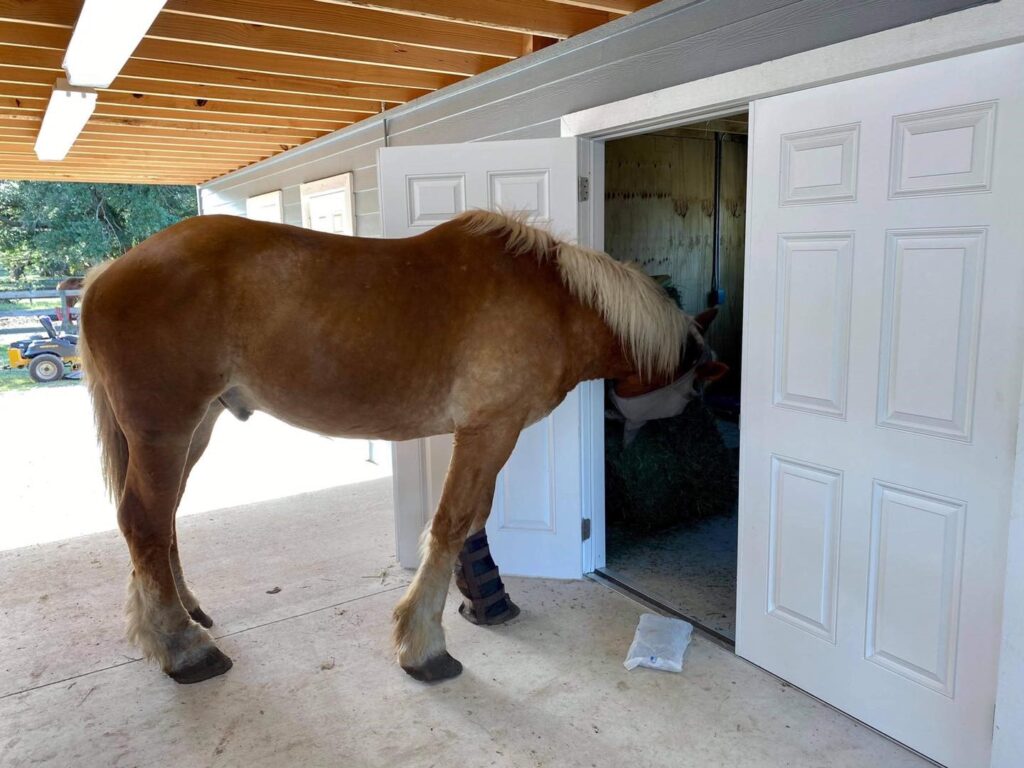
In early April, Zeke was able to arrive at his new home of Baby Girl Horse Rescue and Veteran Therapy Ranch. The group of Belgian Draft Horses rescued alongside Zeke have come to be known as the “Titans.” They are destined to be part of the Titan Project, an endeavor to provide equine assisted therapy for veterans and first responders suffering from post-traumatic stress disorder and other related issues.
“Zeke is quite famous now, especially among the veterans,” explained DeMars. “People who suffer from post-traumatic stress disorder are able to derive strength through Zeke’s story and many have been reaching out through social media asking when he’s coming home so they can come see him. So, his future job is just to be groomed and taken care of. He’s going into retirement to be spoiled.”
The veterinary team at Palm Beach Equine Clinic is dedicated to protecting and providing the best possible outcome for every patient. Through swift action by the rescue and expert veterinary and surgical care, Zeke now has a new purpose and will live out his days in a safe, healthy environment. In the wake of Zeke’s immense suffering, he is now miraculously on the path to paying it forward by providing veterans and first responders the relief and support they need.

For more information or to support Zeke by donating to Baby Girl Horse Rescue and Veteran Therapy Ranch, go to https://www.facebook.com/Babygirlhorserescueranch.